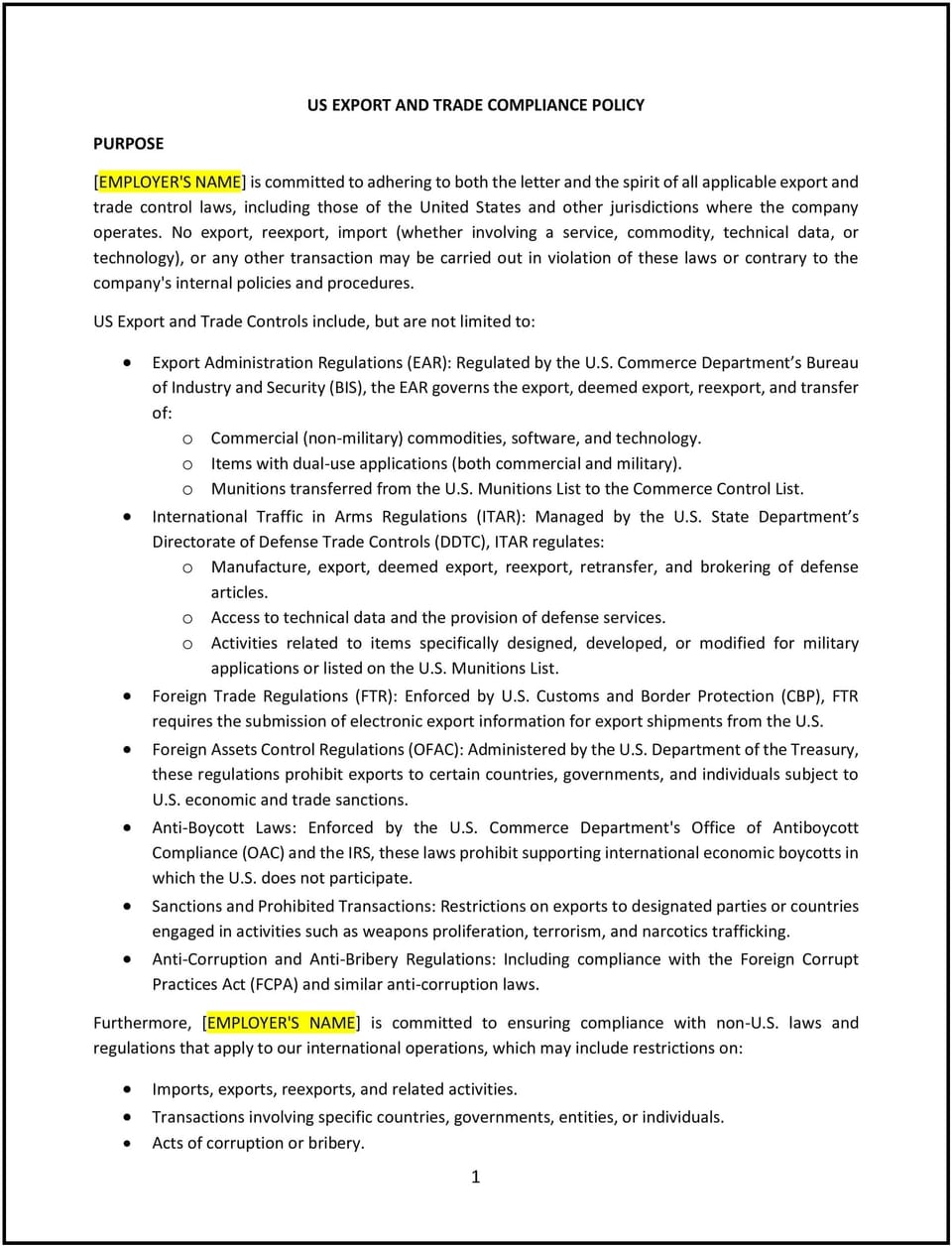US export and trade compliance policy (Alaska): Free template

US export and trade compliance policy (Alaska)
In Alaska, a US export and trade compliance policy outlines guidelines to ensure businesses comply with federal export control laws and trade regulations. This policy provides clear procedures for managing exports, engaging with foreign entities, and avoiding prohibited transactions.
By implementing this policy, businesses can mitigate legal risks, protect national security interests, and maintain a reputation for ethical practices.
How to use this US export and trade compliance policy (Alaska)
- Identify applicable laws: Specify the export control laws and trade regulations the business must comply with, such as the Export Administration Regulations (EAR) and International Traffic in Arms Regulations (ITAR).
- Define restricted activities: Clearly outline prohibited actions, such as exporting controlled goods to embargoed countries or engaging with restricted entities.
- Include screening procedures: Require due diligence checks on partners, customers, and transactions to ensure compliance with US trade laws.
- Outline employee responsibilities: Provide training and resources to help employees understand and fulfill their roles in maintaining compliance.
- Establish reporting protocols: Include procedures for reporting suspected violations, such as notifying the compliance officer or legal counsel.
Benefits of using a US export and trade compliance policy (Alaska)
A US export and trade compliance policy provides significant advantages for businesses in Alaska. Here’s how it helps:
- Ensures legal compliance: Helps businesses avoid fines, penalties, and reputational damage by adhering to federal regulations.
- Reduces risks: Identifies and mitigates risks associated with restricted transactions or non-compliance.
- Protects national security: Aligns with federal efforts to prevent unauthorized access to sensitive technologies and goods.
- Enhances employee accountability: Clarifies responsibilities and promotes awareness of compliance requirements.
- Supports international operations: Provides a framework for engaging in global trade confidently and ethically.
Tips for using a US export and trade compliance policy (Alaska)
- Tailor to industry needs: Include specific guidance for industries prevalent in Alaska, such as fishing, oil, and natural resources, which may involve international trade.
- Use automated tools: Implement software solutions to screen transactions and monitor compliance with export regulations.
- Provide training: Offer regular compliance training for employees involved in export activities to ensure understanding of evolving regulations.
- Maintain detailed records: Keep thorough documentation of all export transactions, including licenses, invoices, and screening results, for auditing purposes.
- Update regularly: Revise the policy to reflect changes in US trade laws, sanctions, or business operations.
Q: What laws govern US export and trade compliance?
A: Key laws include the Export Administration Regulations (EAR), International Traffic in Arms Regulations (ITAR), and Office of Foreign Assets Control (OFAC) sanctions.
Q: How can businesses ensure compliance with export regulations?
A: Conduct due diligence checks, implement screening tools, and provide training to employees involved in trade activities.
Q: What are the consequences of non-compliance?
A: Penalties include fines, loss of export privileges, reputational damage, and potential criminal charges for severe violations.
Q: How should businesses handle restricted transactions?
A: Avoid engaging in transactions with embargoed countries, restricted entities, or individuals listed on government watchlists.
Q: How often should this policy be reviewed?
A: Review the policy annually or whenever significant changes occur in US trade laws, sanctions, or company operations.
This article contains general legal information and does not contain legal advice. Cobrief is not a law firm or a substitute for an attorney or law firm. The law is complex and changes often. For legal advice, please ask a lawyer.


